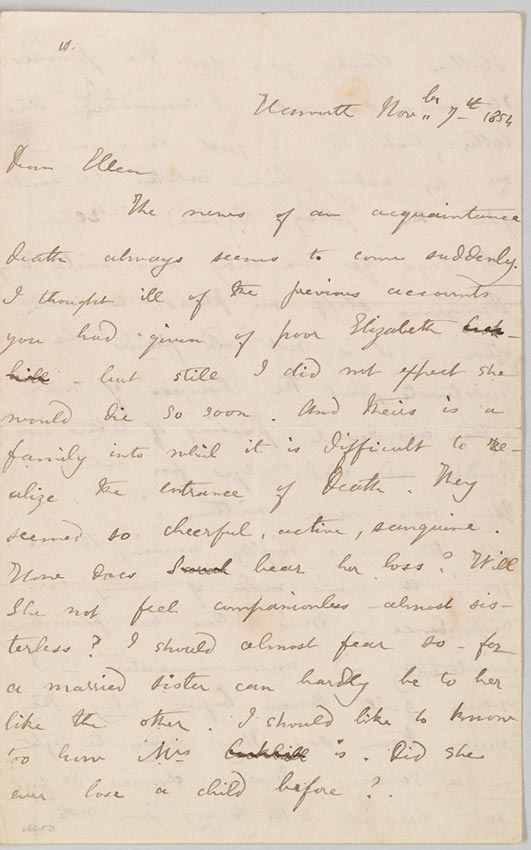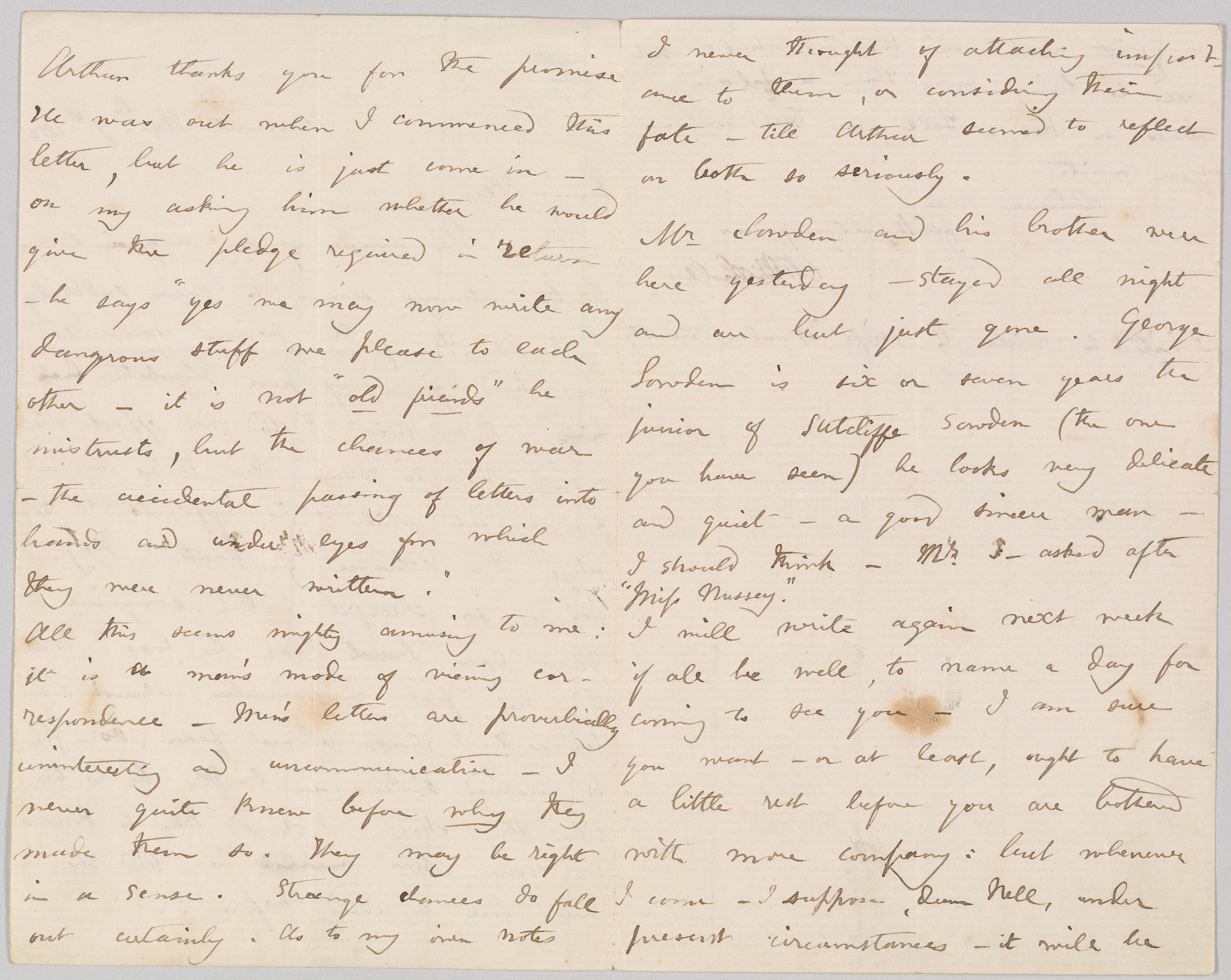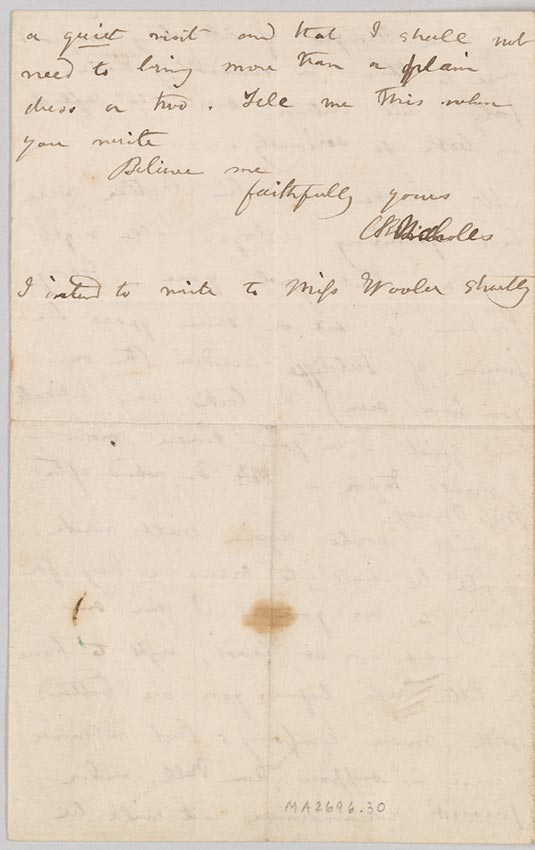11. Letter to Ellen Nussey, 7 November 1854, page 1

Letter to Ellen Nussey, dated Haworth, 7 November 1854
Henry H. Bonnell Collection, bequest of Helen Safford Bonnell, 1969
Brontë’s husband, Arthur Bell Nicholls, was eager to keep his famous wife’s personal letters from prying eyes. He extracted a promise from Ellen Nussey, Brontë’s intimate friend and frequent correspondent, to burn those she received. Brontë died almost five months after writing this letter, which Nussey preserved (along with many others), breaking her disingenuous vow. Brontë’s widower came to understand the public’s longing for personal traces of his late wife, authorizing Elizabeth Gaskell to write the revealing biography she published in 1857.
Dear Ellen
The news of an acquaintance death always seems to come suddenly. I thought ill of the previous accounts you had given of poor Elizabeth Cockhill – but still I did not expect she would die so soon. And theirs is a family into which it is difficult to realize the entrance of Death. They seemed so cheerful, active, sanguine. How does Sarah bear her loss? Will she not feel companionless – almost sisterless? I should almost fear so – for a married Sister can hardly be to her like the other. I should like to know too how Mrs Cockhill is. Did she ever lose a child before?
Letter to Ellen Nussey, 7 November 1854, pages 2–3

Letter to Ellen Nussey, dated Haworth, 7 November 1854
Henry H. Bonnell Collection, bequest of Helen Safford Bonnell, 1969
Brontë’s husband, Arthur Bell Nicholls, was eager to keep his famous wife’s personal letters from prying eyes. He extracted a promise from Ellen Nussey, Brontë’s intimate friend and frequent correspondent, to burn those she received. Brontë died almost five months after writing this letter, which Nussey preserved (along with many others), breaking her disingenuous vow. Brontë’s widower came to understand the public’s longing for personal traces of his late wife, authorizing Elizabeth Gaskell to write the revealing biography she published in 1857.
Arthur thanks you for the promise. He was out when I commenced this letter, but he is just come in – on my asking him whether he would give the pledge required in return – he says “yes we may now write any dangerous stuff we please to each other – it is not “old friends” he mistrusts, but the chances of war – the accidental passing of letters into hands and under eyes for which they were never written.”
All this seems mighty amusing to me: it is a man’s mode of viewing correspondence – Men’s letters are proverbially uninteresting and uncommunicative – I never quite knew before why they made them so. They may be right in a sense. Strange chances do fall out certainly. As to my own notes I never thought of attaching importance to them, or considering their fate – till Arthur seemed to reflect on both so seriously.
Mr Sowden and his brother were here yesterday – stayed all night and are but just gone. George Sowden is six or seven years the junior of Sutcliffe Sowden (the one you have seen) he looks very delicate and quiet – a good sincere man – I should think – Mr. S – asked after “Miss Nussey.”
I will write again next week if all be well, to name a day for coming to see you – I am sure you want – or at least, ought to have a little rest before you are bothered with more company: but whenever I come – I suppose, dear Nell, under present circumstances – it will be
Letter to Ellen Nussey, 7 November 1854, page 4

Letter to Ellen Nussey, dated Haworth, 7 November 1854
Henry H. Bonnell Collection, bequest of Helen Safford Bonnell, 1969
Brontë’s husband, Arthur Bell Nicholls, was eager to keep his famous wife’s personal letters from prying eyes. He extracted a promise from Ellen Nussey, Brontë’s intimate friend and frequent correspondent, to burn those she received. Brontë died almost five months after writing this letter, which Nussey preserved (along with many others), breaking her disingenuous vow. Brontë’s widower came to understand the public’s longing for personal traces of his late wife, authorizing Elizabeth Gaskell to write the revealing biography she published in 1857.
a quiet visit and that I shall not need to bring more than a plain dress or two. Tell me this when you write
Believe me
faithfully yours
C Brontë Nicholls
I intend to write to Miss Wooler shortly